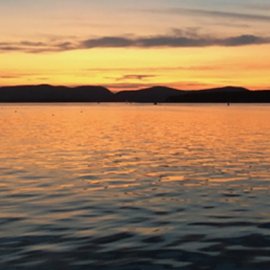Ocean Time
-
English
-
ListenPause
[intro music, ocean sounds]
Welcome to World Ocean Radio…
I’m Peter Neill, Founder of the World Ocean Observatory.
We are in an unknown time zone when, lost in social and political circumstance, we lose track of when, where, who, and what we are in a no longer predictable continuum. It is the worst kind of timelessness – a suspension of familiar order, sequence, and meaning. History as experienced time seems to have been forgotten. Traditions and accepted norms have been dissolved into things unrecognizable, unimaginable, impossible. What time is it? All I know is that it’s changing.
It is like Alice’s clock in Wonderland, perpetually stuck at 6 o’clock, indifferent to the past, indifferent to the future. Alice is us, caught in the absurdity of the Mad Hatter’s dream that is, at once, didactic and final, chaotic without end, egotistic and antagonistic to all of us, invited and disinvited, to the party. We’re late, very late to a very important date, but we don’t know where or what it is; we seem paralyzed, and out of time.
We must re-capture the moment…but how? One option is to cling to old routines, but they seem compromised, no longer capable to protect us. A second option is to resist, in the name of past verities, but it would appear that many have lost faith in those truths that have for so long directed our way. We can’t go back again, but we can start new, using the challenge of disruption to invent a third way forward, what I call a “pro-volutionary” vector – a collective effort for, and through to a new iteration of how we live, according to what standards and beliefs that, as new, contribute to a changing definition of civilization.
Consider the Conference of the Parties, the global initiative to address a specific set of goals and objectives to address climate change, specifically strategies to mitigate past consequence by pursuing alternative technology and new solutions. The promise of COP25, and the signing of the so-called Paris Agreement in 2015, an international plan within the United Nations Framework Convention on Climate Change dealing with greenhouse gas emissions mitigation, adaptation and finance starting in the year 2020 with ambitious goals to be achieved by 2030 with many important public and private commitments of resolve and finance to make it so.
We are now ten years on, and, while there is ample evidence of the success of energy transition from oil and gas to solar and wind, there is a sad, cynical, concomitant decline of commitment, contribution, and political will fostered by vested interest, short term profit, withdrawal of financial support, and subversion by the regressive politics of certain major players, the US, Russia, and India among them.
Is a third way forward all too philosophical, high-minded, impractical, complicated, and useless? Is confrontation with business as usual, at international meetings or even in our own homes, an idealistic endeavor already out of time? I don’t think so. I hope not.
There is such a thing as ocean time, defined as “the indefinite continued progress of existence and events in the past, present, and future regarded as a whole,” and nurturing our existence. The ocean gives us strength and vision, in its infinite energy and eternal patterns, aligns our inner clock, the gyroscope that regulates and balances our actions and beliefs in a wise, therapeutic means and measure for keeping time.
If we draw strength from ocean energy, we can devise, yes, invent, a way forward beyond resistance in the name of old ideas that have been exhausted, or corrupted, to no longer serve us well. We can choose new actions to apply at every level of social involvement – as local or global engagement in the shifting space and time around us.
The way forward is opportunity for something different, something new, as action more attuned to solution to the challenges we face. And we can draw strength, not just from the revitalizing power of ocean time, but also from dear Alice who, as she exits the Tea Party, says “Now, I’ll manage better this time,” and starts down the rabbit hole again. Which way? Which way?
We will discuss these issues and more in future editions of World Ocean Radio.
[WORLD OCEAN RADIO IS DISTRIBUTED BY THE PUBLIC RADIO EXCHANGE AND THE PACIFICA NETWORK, FOR USE BY COLLEGE AND COMMUNITY RADIO STATIONS WORLDWIDE. FIND US WHEREVER YOU LISTEN TO PODCASTS, AND AT WORLD OCEAN OBSERVATORY DOT ORG, WHERE THE FULL CATALOG OF MORE THAN 700 RADIO EPISODES IS SEARCHABLE BY THEME.][outro music, ocean sounds]
This week on World Ocean Radio we are reflecting on a time and place no longer familiar: traditions and accepted norms unrecognized, histories forgotten, futures uncertain. How do we recapture standards and beliefs that can contribute to a changing civilization and rapidly changing climate? Are there opportunities for new ways of thinking and acting that are attuned to the challenges we face? We're discussing this and more. Join us.
About World Ocean Radio
World Ocean Radio is a weekly series of five-minute audio essays available for syndicated use at no cost by college and community radio stations worldwide. Peter Neill, Founder of the World Ocean Observatory and host of World Ocean Radio, provides coverage of a broad spectrum of ocean issues from science and education to advocacy and exemplary projects.
World Ocean Radio
15 years
More than 760 episodes
Ocean is climate
Climate is ocean
The sea connects all things
- Login to post comments



